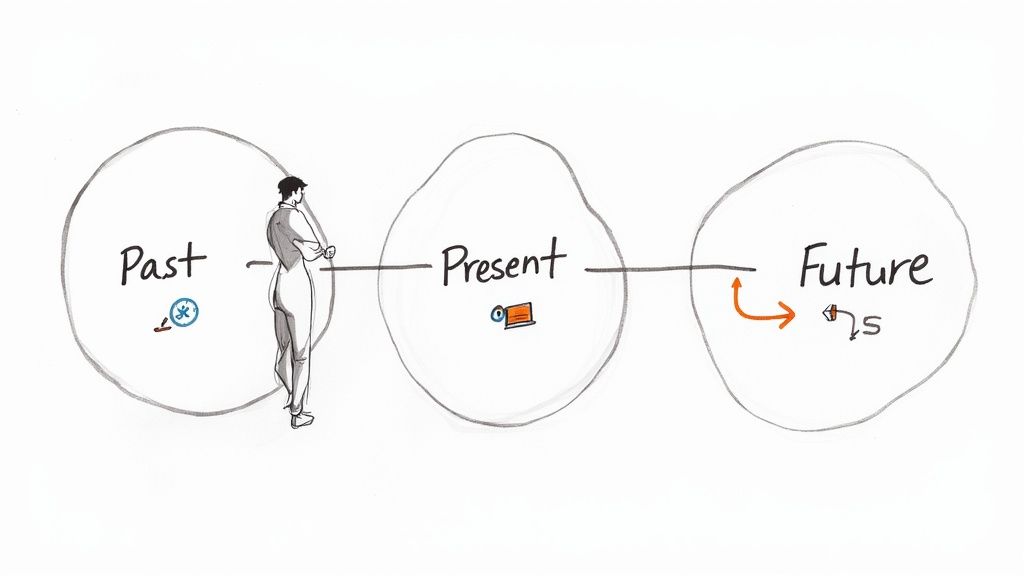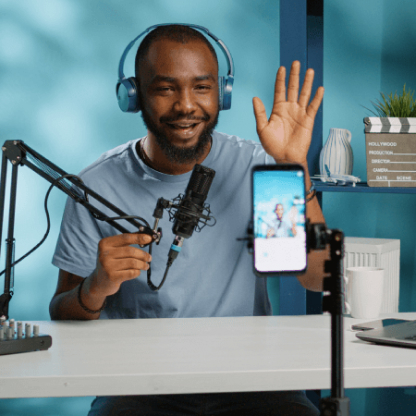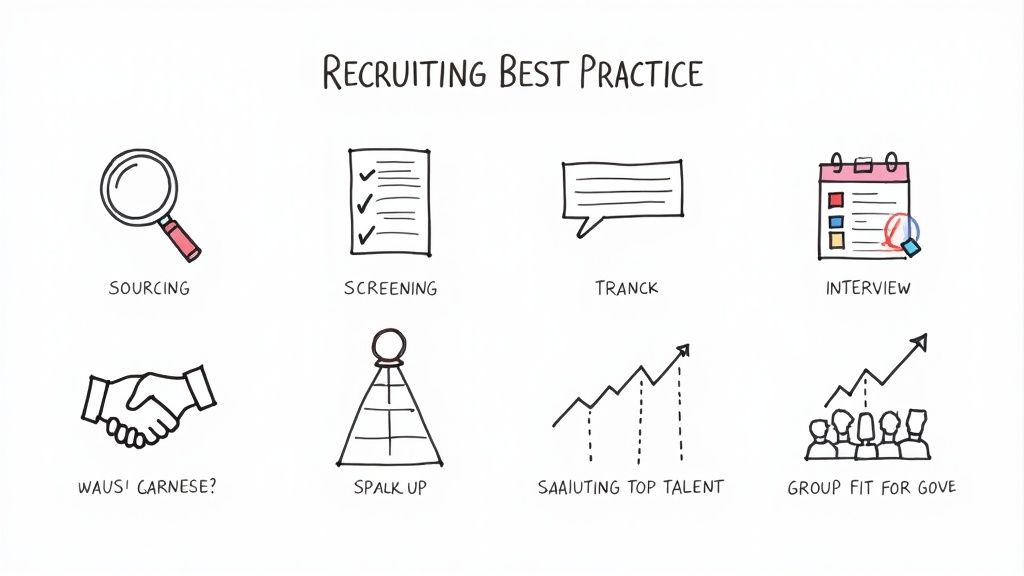Let's be honest. Your current recruitment process is a coin toss, and you know it. You're asking the same tired questions, getting the same rehearsed answers, and just hoping for the best. I've been there, mortgaging my sanity on candidates who sounded great on paper but folded under pressure or nuked the team culture. The problem isn't always the talent pool; it's the questions. Get this wrong, and I hope you enjoy spending your afternoons fact-checking resumes—because that’s now your full-time job.
This isn't just another generic list. This is a battle-tested playbook of recruitment process interview questions designed to cut through the fluff and reveal who a candidate really is. We'll break down not just what to ask, but why it works and what red flags to listen for. To understand what candidates are preparing for, reviewing guides on common interview questions and answers can give you an edge in framing your own questions to get past rehearsed responses. Consider this your intervention. We're going to stop the insanity and start hiring smarter.
1. Tell Me About Yourself
Let's start with the classic, the OG, the question that kicks everything off. Don't be fooled by its simplicity; this isn't a warm-up. It's the first test. Asking "Tell me about yourself" is your chance to see if a candidate can pitch themselves concisely and connect their experience directly to the hole you're trying to fill. It’s less about their life story and more about their professional sales pitch.

A great answer isn't a ramble through their LinkedIn profile. It’s a structured, compelling story. A bad answer is… well, you've heard them. The ones that start with their childhood pet and end ten minutes later with you wondering what job you're even hiring for. You’re handing them the microphone; now, let’s see if they can hold a tune.
Actionable Tips for Recruiters
- Look for the "Past, Present, Future" Model: The good ones touch on past wins, connect them to their current situation, and frame your job as the only logical next step. It's clean, it's smart, it's respectful of your time.
- Don't Interrupt (At First): Let them hang themselves, or impress you. Their unscripted pitch reveals their natural communication style and preparation level. Did they practice, or are they winging it?
- Note What They Emphasize: What do they lead with? The skills, the projects, the awards? It tells you what they think is most valuable about themselves, which may or may not align with what you need.
- Prepare Follow-Up Questions: Their answer is a goldmine for deeper questions. If they mention a key project, jot it down to circle back to later. It shows you’re listening and turns a monologue into a dialogue.
2. Why Do You Want This Job?
If "Tell me about yourself" is the opening act, this question is the main event. It’s where you separate the casual browsers from the genuinely invested candidates. Asking "Why do you want this job?" cuts through the noise to reveal their true motivations. Are they here for the mission or just the paycheck?

A lazy answer here is an immediate disqualifier. It shows they haven't done their homework or, worse, they just want any job. I’ve seen companies like Zappos live and die by this question, using it to screen for an almost fanatical level of cultural alignment. You're looking for someone who sees this role as a destination, not a bus stop.
Actionable Tips for Recruiters
- Listen for Specificity: Did they mention a recent product launch, a blog post your CEO wrote, or a specific company value? Specifics show genuine research. Anything else is just flattery, and flattery won't ship code.
- Probe Beyond the Compliments: If they say, "I love your company culture," pin them down. Ask what specifically resonates with them and why. Don’t let them get away with generic praise. Make them connect it to their own work style.
- Connect Their Goals to Your Needs: A great candidate explains how this role helps them and how their ambitions will help you. It's a two-way street. If it's all about them, it's a no from me.
- Evaluate Passion and Enthusiasm: Are they genuinely excited about the problems they'll be solving? Motivation is a bigger predictor of performance than a fancy degree. This is a key part of many effective video interview questions as well, where you can literally see if they light up or not.
3. Describe a Challenge You Overcame
This isn't about hearing a hero's journey; it's about seeing the receipts. Asking a candidate to describe a challenge they overcame is a classic behavioral question designed to see if they have any real-world problem-solving skills, resilience, and accountability. Time to move past hypotheticals and into what they’ve actually done when things inevitably hit the fan.

A top-tier answer isn’t a complaint about a difficult boss or a vague success story. It’s a structured narrative that shows they can think. Companies like Amazon build their entire interview cult—I mean, process—around questions like this to see how candidates handle ambiguity and deliver results. You’re asking them to prove their value, not just talk about it.
Actionable Tips for Recruiters
- Listen for the STAR Method: The best answers follow the Situation, Task, Action, and Result framework. It shows they can organize their thoughts and aren't just making it up as they go.
- Probe for Ownership: Listen to the pronouns. Do they say "we faced a problem" but "I solved it," or do they deflect blame? You're looking for accountability, not excuses. The buck has to stop somewhere.
- Demand Specifics and Metrics: "The project was a success" is a meaningless statement. A red flag. Ask, "By how much?" or "What was the impact on revenue?" The proof is in the numbers.
- Focus on the "Learned" Part: The challenge is only half the story. A great candidate will also tell you what they learned. This reveals self-awareness and a commitment to not making the same mistake twice, a key part of good competency-based interview questions.
4. What Are Your Weaknesses?
Ah, the question everyone loves to hate. Don’t roll your eyes; this isn't a trap. It's a high-stakes test of a candidate's self-awareness, honesty, and humility. It’s your best window into their coachability. You're not looking for a fatal flaw; you're looking for someone who doesn't think they're perfect. Because if they do, run.
A good answer dodges the cliché "I'm a perfectionist" trap and offers a moment of genuine insight. Think about how a company like Salesforce assesses vulnerability as a sign of strong emotional intelligence. A candidate who can talk about a real weakness and what they're doing about it is a candidate who is ready to grow with you.
Actionable Tips for Recruiters
- Listen for the Action Plan: A great response has two parts: the weakness itself and the concrete steps they're taking to fix it. "I'm taking a course," "I've asked for mentorship," "I use this tool to stay organized." This shows initiative.
- Watch Out for "Strengths in Disguise": If they say their weakness is "working too hard" or "caring too much," call them on it. Gently push for a real answer. These are rehearsed non-answers that scream "I don't do self-reflection."
- Assess the Relevance (and Severity): Note if the weakness they choose is a deal-breaker. A back-end developer admitting to weak public speaking skills is fine. A sales lead admitting the same thing? That’s a five-alarm fire.
- Gauge Their Reaction: How you respond to their vulnerability matters. Nodding and showing that you see it as a sign of strength encourages a more honest conversation. This is where you build real trust.
5. Tell Me About a Time You Worked on a Team
No one works in a vacuum. Not even that brilliant solo coder you're trying to hire. This question cuts through the "I" on a resume to see how they actually play with others. It’s one of the most revealing questions in your toolkit, separating the lone wolves from the true team players.
A weak answer is all about their individual heroics: "I did all the work, and the team got the credit." A strong answer sounds like they were part of an ensemble cast where everyone knew their role. Think of how Zappos uses this to protect its team-first culture. You need to know if they build bridges or burn them.
Actionable Tips for Recruiters
- Listen for "We," not "I": Their pronoun choice is a dead giveaway. An abundance of "I" suggests a massive ego. Consistent use of "we" shows a collaborative mindset. It's that simple.
- Probe for Conflict Resolution: Great teams aren't conflict-free; they’re just good at navigating it. Ask a follow-up: "Were there any disagreements? How did you handle them?" This reveals maturity.
- Assess Their Role Recognition: Do they acknowledge a teammate's specific contribution? Can they see beyond their own keyboard? This shows they can appreciate and leverage a diverse skill set instead of just tolerating it.
- Look for Adaptability: Ask how they adapted their style to accommodate others. This is crucial for figuring out if they’ll integrate into your team’s unique, and probably weird, dynamics.
6. Why Are You Leaving Your Current Job?
This is where you separate the runners from the growers. Are they running from a dumpster fire, or are they running toward a better opportunity? Their answer is a direct window into their motivation, stability, and professional maturity. It’s one of the most potent recruitment process interview questions you can ask.
A great candidate has a clear, positive narrative. They’re not here to vent about their micromanaging boss. They're here because your role is the logical and exciting next chapter. An executive recruiter would toss a resume in the bin for a candidate who can't articulate a forward-looking reason for leaving. You should too.
Actionable Tips for Recruiters
- Listen for Positive Framing: A strong answer focuses on what they hope to gain (new skills, more responsibility), not what they’re escaping.
- Probe for Specifics, Not Gossip: If they say they’re seeking "growth," ask what that looks like. Is it management? Technical depth? Don't let them off the hook with a generic answer.
- Assess Their Professionalism: How do they talk about their old boss? Even if it was a nightmare, a pro will be diplomatic. Any sign of badmouthing is a giant red flag. You're next on their list.
- Connect Their "Why" to Your "What": The best answers naturally link their reasons for leaving to what your role offers. This is the difference between genuine interest and just blasting out resumes. It can be explored further with insights from screening questions that reveal candidate intent.
7. Describe Your Ideal Work Environment
This question cuts right to the core of retention: cultural fit. This isn't about their preference for open-plan offices. This is a strategic probe to see if they'll thrive or wither in your specific ecosystem. Will they love your brand of chaos or will it send them running for the hills?
A fantastic answer shows self-awareness and research. It connects their desire for autonomy, collaboration, or structure directly to what they know about your company. Think of how Netflix uses its culture deck to attract people who crave freedom and responsibility. You're trying to prevent the dreaded "it's not a good fit" conversation six months from now.
Actionable Tips for Recruiters
- Listen for Keywords: Do they say "collaboration," "autonomy," "fast-paced," "structured"? Their vocabulary tells you what they need to succeed and whether you can provide it.
- Be Radically Honest: If you're a chaotic startup, don't pretend you're a buttoned-up corporation. Misrepresenting your culture is a recipe for a quick turnover. Frame your reality honestly and see if they flinch.
- Ask a Follow-Up: "What Don't You Like?": Ask them to describe a work environment where they wouldn't succeed. This is often where the real truth comes out.
- Connect it to the Role: Frame the discussion around the actual job. An engineer might need quiet time. A sales lead needs a buzz. Show you get it.
8. How Do You Handle Conflict or Disagreement?
Time to separate the professionals from the hotheads. Workplace disagreements are inevitable. Productive outcomes are not. This question is your lens into a candidate's emotional maturity and communication skills. You're not looking for someone who avoids conflict; you're looking for someone who handles it like an adult.
This is a cornerstone of behavioral interviewing. Amazon tests this against their "Disagree and Commit" principle. Consulting firms use it to see if a candidate will fold under client pressure. The goal isn't to find out if they have conflict, but how they turn it from a problem into a solution. A weak answer blames others; a strong one shows ownership.
Actionable Tips for Recruiters
- Listen for the STAR Method: Again, a great response follows the Situation, Task, Action, Result model. They should describe a specific conflict, their role, the steps they took, and the positive outcome.
- Probe for Emotional Intelligence: Did they try to understand the other person’s perspective first? Or did they just steamroll them? Look for phrases like "I tried to see where they were coming from."
- Evaluate Their Definition of a "Win": A successful resolution isn't about one person "winning." The best candidates describe a compromise or a decision made for the good of the project, even if it wasn't their idea.
- Ask What They Learned: A powerful follow-up: "What did you learn from that?" This reveals self-awareness. It’s a key part of screening for top-tier talent in any list of recruitment process interview questions.
9. What Are Your Long-Term Career Goals?
This question is your crystal ball. You're not just hiring for a job; you're investing in a person. You need to know if their future includes you. Asking about long-term goals reveals ambition, foresight, and whether they see this job as a stepping stone or a cornerstone.
A great answer isn't a generic "I want to be a manager." It's a thoughtful vision that logically connects to the opportunity in front of them. Big companies use this to identify future leaders who plan to grow with them, not just use them as a launchpad. You need to see if their roadmap aligns with the highways you're building.
Actionable Tips for Recruiters
- Listen for a 5-Year Horizon: A solid answer looks about five years out. It shows they've thought about the future but aren't delusional.
- Assess the Realism: Is their ambition grounded, or do they plan on being CEO by next Christmas? Unrealistic goals can signal a massive disconnect from reality.
- Connect Their Goals to Your Pathways: If they want to develop a specific skill, do you offer that? A candidate whose goals align with your company's growth tracks is a candidate who will stick around.
- Probe for 'How': If they say they want to become an expert, ask how they plan to get there. Are they reading? Taking courses? Seeking mentors? This separates the dreamers from the doers.
10. Tell Me About a Time You Showed Initiative or Leadership
This isn't just a question for the VPs. You're looking for people who don't wait to be told what to do. This question separates the doers from the task-takers. It’s a direct window into a candidate’s capacity to create value beyond their job description.
A top-tier answer isn't about organizing the office pizza party. It’s a concrete example of them identifying a problem, rallying support, and driving it to a measurable outcome. This is how you find the people who act like owners, not renters.
Actionable Tips for Recruiters
- Listen for the "Why": A great candidate won’t just explain what they did, but why it was necessary. Did they spot an inefficiency? A customer pain point? This reveals strategic thinking.
- Probe for Influence, Not Authority: How did they bring others on board without being the boss? Did they use data, build consensus, or just inspire people? This is true leadership potential.
- Demand Quantifiable Results: Vague statements like "it improved things" are useless. Press for specifics. How much time was saved? What was the revenue impact? Real impact has real numbers.
- Ask About the Pushback: No real initiative goes unopposed. Ask what obstacles they faced. This uncovers their resilience and problem-solving skills when things get tough.
10 Key Interview Questions Comparison
| Question | 🔄 Implementation Complexity | ⚡ Resource Requirements | 📊 Expected Outcomes | 💡 Ideal Use Cases | ⭐ Key Advantages |
|---|---|---|---|---|---|
| Tell Me About Yourself | 🔄 Low — open-ended, easy to administer | ⚡ Minimal — 2–5 minutes, single interviewer | 📊 Snapshot of background & communication | 💡 Opening question / initial screen | ⭐ Builds rapport; reveals prioritization |
| Why Do You Want This Job? | 🔄 Medium — needs probing for specificity | ⚡ Low–moderate — interviewer prep to assess fit | 📊 Motivation, research depth, cultural fit | 💡 Cultural-fit checks; mid-stage interviews | ⭐ Predicts engagement & retention |
| Describe a Challenge You Overcame | 🔄 Medium–High — structured STAR responses needed | ⚡ Moderate — follow-ups to verify impact | 📊 Problem-solving, resilience, measurable results | 💡 Competency/behavioral interviews | ⭐ Provides evidence-based competency signals |
| What Are Your Weaknesses? | 🔄 Medium — sensitive to phrasing and response bias | ⚡ Low — quick question but requires judgment | 📊 Self-awareness, coachability, development focus | 💡 Later-stage interviews; development discussions | ⭐ Reveals honesty and growth orientation |
| Tell Me About a Time You Worked on a Team | 🔄 Medium — requires clarity on role vs. group | ⚡ Moderate — probe for dynamics and conflict handling | 📊 Collaboration style, communication, conflict management | 💡 Team-based roles; cultural-fit assessment | ⭐ Predicts team integration and interpersonal fit |
| Why Are You Leaving Your Current Job? | 🔄 Medium — can be delicate, risk of defensiveness | ⚡ Low–moderate — needs follow-up to contextualize | 📊 Motivation drivers, stability, professionalism | 💡 Screening for red flags; hiring manager discussion | ⭐ Differentiates running-toward vs. running-from motives |
| Describe Your Ideal Work Environment | 🔄 Low–Medium — subjective, relies on honesty | ⚡ Low — conversational, minimal time | 📊 Cultural alignment and work-style expectations | 💡 Early screening for culture fit and retention | ⭐ Helps reduce post-hire mismatches |
| How Do You Handle Conflict or Disagreement? | 🔄 Medium–High — best with real examples | ⚡ Moderate — probing required to assess EQ | 📊 Conflict-resolution style, emotional intelligence | 💡 Leadership roles; high-collaboration teams | ⭐ Predicts maturity and solution orientation |
| What Are Your Long-Term Career Goals? | 🔄 Low–Medium — straightforward but revealing | ⚡ Low — brief discussion, interviewer evaluation | 📊 Ambition, alignment with company trajectory | 💡 High-potential hires; succession planning | ⭐ Identifies growth potential and retention fit |
| Tell Me About a Time You Showed Initiative or Leadership | 🔄 Medium–High — needs concrete impact evidence | ⚡ Moderate — follow-ups to quantify influence | 📊 Initiative, ownership, ability to mobilize others | 💡 Leadership-track roles; startups; growth hires | ⭐ Surfaces proactive, high-potential talent |
The $500 Hello: How to Stop Guessing and Start Hiring
So, there you have it. A full arsenal of recruitment process interview questions designed to get past the corporate jargon and find out if someone can actually do the job. We’ve moved beyond the stale queries and into territory that reveals genuine insight. From dissecting past challenges to understanding future ambitions, these questions are your toolkit for building a team that doesn't suck.
But let’s be brutally honest. Asking brilliant questions in a broken system is like putting a V8 engine in a car with no wheels. You've got the power, but you're not going anywhere. The real magic happens when you pair a sharp line of questioning with an equally sharp process. Without it, you’re just having slightly more interesting conversations that still lead to gut-feel hires and expensive mistakes.
From Good Questions to Great Hires: The System is Everything
The biggest takeaway here isn't a single question; it's the framework. Your goal is to stop being a professional interviewer and start being a professional evaluator of talent. This means you have to operate differently.
- Consistency is Your Best Friend: Every candidate gets the same core questions, delivered the same way. This is the only way to create a fair, apples-to-apples comparison and kill the bias that creeps in when interviews go off-script.
- Data Over Drama: Stop relying on your memory of a "good vibe." Your process needs to generate real data. Tools like the best interview transcription software can create searchable records of every conversation, making your review sessions infinitely more productive and less about who has the loudest opinion.
- Time is Your Most Valuable Asset: Your time is better spent evaluating high-potential candidates, not repeating the same screening questions for the tenth time. A smart system automates the boring stuff, freeing you up to make the high-impact decisions that actually matter.
Ultimately, mastering these recruitment process interview questions is about more than just filling a seat. It's about building a predictable engine for finding the right people. It’s about making fewer hiring mistakes and saving yourself from the agony of realizing three months in that you hired a great talker but a poor performer. This is how you stop guessing. Turns out there’s more than one way to hire elite talent without mortgaging your office ping-pong table.
Ready to stop wasting time and start making smarter hires? Async Interview embeds these powerful questions into a scalable video interview process, so you can screen more candidates in less time and get the data you need to hire with confidence. Fix your hiring process for good with Async Interview.





